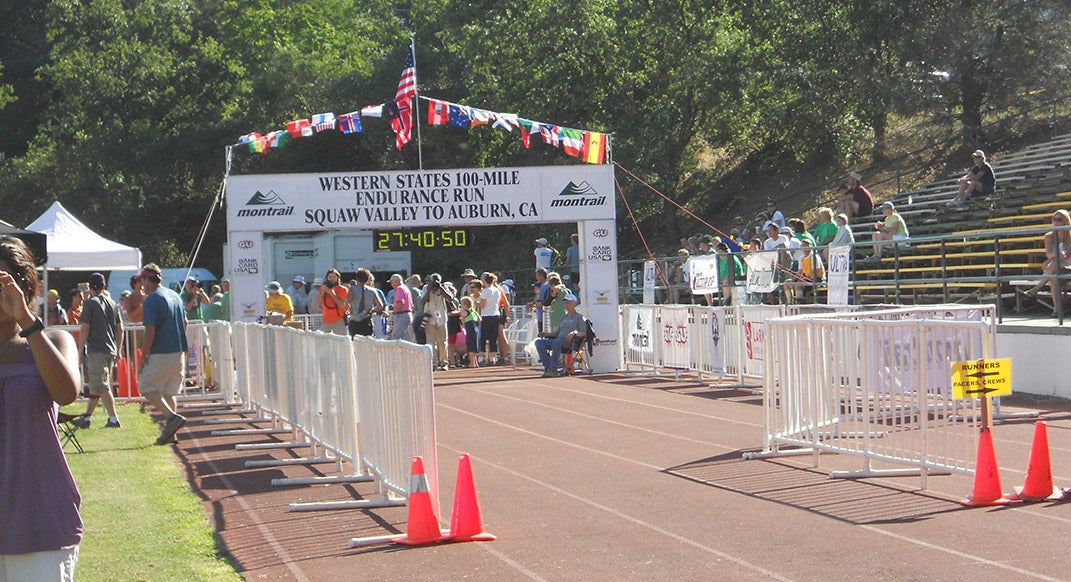Western States Will Drug Test at Next Month’s Race

The Western States Endurance Run will start testing for performance-enhancing drugs this year, race organizers announced Wednesday.
The country’s oldest and most competitive 100-miler, Western States occupies a place of unique prestige within trail running. Its adoption of a drug-testing policy marks a significant step for a sport with few anti-doping controls.
“This action will hopefully spur other events in the trail space to join this clean sport initiative and provide education, testing and a zero-tolerance policy,” says Nancy Hobbs, the executive director of the American Trail Running Association.
Though anyone starting the June 24 race may be selected for post-competition testing, the focus will be on elite athletes and top age-group runners, according to a press release.
“We want to promote a drug-free sport, and we want to lead in this effort,” says Craig Thornley, the race director for Western States.
Western States follows in the footsteps of the Pikes Peak Marathon and Ascent, which began testing in 2013 and has remained the only U.S. trail race to do so. A few high-profile ultras—such as the Ultra-Trail du Mont-Blanc—conduct testing, and select individuals who race at world championships have been subject to random drug screening.
Elite athletes praised the race’s decision in interviews and on social media.
“It’s huge,” says Stephanie Howe Violett, who won Western States in 2014. “I literally jumped up and down when I found out. It seems like there’s so much talk, but there’s no action being taken. This is an actual step.”
“They are setting an example for other trail races,” says Joe Gray, the 2016 World Mountain Running champion. “If races with high monetary gain begin strict testing we will soon start to deter cheaters.”
Discussion around doping in ultrarunning has flared up several times in recent years.
In December 2015, Eliza Desco—an Italian runner who served a two-year ban after testing positive for EPO in 2009—prompted an outcry when she signed up for the high-profile North Face 50 San Francisco.
In 2016, the Ultra-Trail du Mont-Blanc dinged a former 5th-place finisher for EPO use. Greg Vollet, a former pro cyclist who had once tested positive for banned stimulants, placed second at The Rut 50K in Montana. And admitted doper Lance Armstrong continued his controversial foray into trail running.
(Desco has denied using EPO. Vollet has said his stimulant use was inadvertent.)
Western States organizers began to discuss a testing program shortly after the Desco controversy, according to Thornley, the race director.
“The elite athletes have been asking us to do this,” he says. “We tried to implement something last year, but without a governing body, it’s really, really hard.”
The race took a public stand in February 2016, with its adoption of a “zero-tolerance policy” toward performance-enhancing drugs that barred any convicted doper from Western States for life.
But ironing out the legal, financial and practical aspects of drug testing took somewhat longer.
Thornley declined to specify the exact price tag. “It is expensive, I will say that,” he says. The race will pay for it from “reserve funds,” he adds, rather than raising entry fees or charging sponsors more.
“Testing is expensive, so this is really an impressive effort on their part and signals a deep commitment to clean sport,” says Shanna Burnette, president of the Clean Sport Collective.
Race organizers and athletes recognize that the Western States policy is not a cure-all, as savvy drug cheats can time their doses to avoid detection at events.
“[This is] a great promotion of clean sport for all and I know it takes a lot of hard work, support and money make this all happen,” says former Speedgoat 50K champ Sage Canaday. “However, I also believe that it is very easy for dopers to ‘micro dose’ … and ‘taper off the juice’ heading into a race that they know that they will be tested at. Unless PED-specific tests are pure surprise, I don’t believe that they are as effective.”
“We are not naïve,” Thornley says. “We know that competition testing is easily defeated, if the athlete stops taking whatever they’re taking. But we have to start somewhere.”
While trail running’s decentralized nature makes out-of-competition testing or a biological passport system difficult, Thornley says he hopes to see things move in that direction—perhaps with the formation of a governing body, or even a consortium of major U.S. races.
“To date, the call for drug testing has far outweighed the willingness of most stakeholders to pay for it,” says Richard Bolt, the marketing director of the American Trail Running Association. “Hopefully, this will be a tipping point, causing race directors, sponsors and athletes to all chip in.”